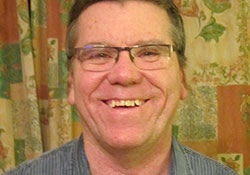Northern Ireland, United Kingdom: Jay Flood-Coleman

Jay Flood-Coleman
Health experience related to: chronic pain
Structured education sessions for people living with long-term chronic pain can foster coping mechanisms that reduce dependence on medications and improve quality of life.
I suffered 2 brain haemorrhages in the early 1990s. After the second one, I lost a quarter of my brain and about 50% function of my body and have spent many years since trying to rebuild both.
At the rehabilitation unit, there was a review team that asked me questions about my recovery. It became apparent to them that not being able to pick up my newborn daughter due to my disability was causing me a lot of distress. They sent me to a medical engineering firm that made a special harness designed around the baby's dimensions that would help me lift her up. That service gave me hope. Individuals cannot recuperate properly until they find some degree of hope and that certainly provided hope for me. The rehabilitation unit also had a staff psychologist who helped people with their mental recovery. This is the kind of service that focuses on the future rather than just looks at physical care.
A few years later, I started having chronic pain. The more I was trying to regain my mobility, the more pain I was in, so I went up higher and higher on pain medication. I was concerned that I could become a prescription drug addict, but since I didn't know a better way to manage the pain I was dependent on the drugs. Eventually I began using opioids. The high dosages affected my home life, because I couldn't focus on my family properly.
There has to be a way for people who experience chronic pain to be more educated about what the source of their pain is and what they can do about it. Chronic pain is not always being assessed properly and is often seen only in relation to another condition.
One of the best things that happened to me was taking a pain management course and having just one lecture by a consultant anaesthesiologist on the effect of drugs on the body. That was extremely useful in helping me reduce my use of opioids. The goal of a pain management course is to help people understand and manage pain Two aspects of this are making changes to their lifestyle and home environment. It allows them to discuss their individual pain with medical professionals and other people experiencing chronic pain, which can help with developing coping and planning strategies.
The most important thing about managing chronic pain as a patient is being believed. That means having a care provider who is willing to listen and say, "Yes, I understand your experience and pain, and we need to do something about it." And on the patient's side, it's important to have an outward focus in order to find a way to move forward in your life through the pain by understanding what triggers or makes it worse.
Self-determination is important, but sometimes you need people to help you see the light at the end of the tunnel. So being believed about your pain, being educated about what you can do about it and having a good rapport with health professionals are extremely important.
What I would like to see established in Northern Ireland and elsewhere is locally supported chronic pain clinics facilitated by people who have chronic pain and are experts-by-experience. That would help the community come together locally and understand pain better through improved information. For the health system, it would free up significant amounts of money.
I am inspired by seeing that the issue of chronic pain is finally being taken up as a national issue. That has given me hope. As long as you give a person hope, they can change their life and maybe change others' lives for the better. In this way we can perhaps also see how weaknesses we experience in our lives can be turned into strengths.



